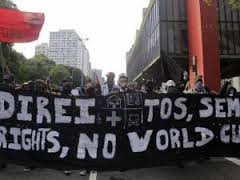By Andrew Warshaw
January 27 – The staging of this year’s World Cup in Brazil has come under renewed intense scrutiny following fresh street protests over the cost of hosting the tournament.
Unlike the widespread demonstrations that marred last year’s Confederations Cup, which mainly targeted the lack of acceptable public services, the latest outbreak was specifically related to World Cup funding and is bound to be of concern both to organisers and FIFA as the pressure continues to build over Brazil’s readiness to host the event for the first time in over half a century.
FIFA president Sepp Blatter and his general secretary Jerome Valcke have already expressed their concerns about the delays to Brazil’s massive World Cup infrastructure programme, in particular stadium renovation. One stadium, in Curitiba, has been given until February 18 to complete its work or risk being kicked out as hosts.
The weekend protests drew some 1000 demonstrators into the streets of Brazil’s largest city, Sao Paolo, which stages the symbolic opening game of the World Cup between Brazil and Croatia. Many of them waved flags and banners chanting “if we have no rights, there will be no Cup.”
The figure was far less than the one million who took to the streets for the Confederations Cup, the traditional dress rehearsal for the World Cup, yet the cost of new stadiums has outraged many Brazilians who are demanding more investment in public transportation, healthcare and education.
Although the Sao Paulo demonstration was mainly peaceful, more than 100 people were detained after shops and banks were damaged in sporadic acts of violence which forced the authorities to cancel some of the festivities planned for the city’s 460th anniversary.
Later protest groups billed the march as the first act in 2014 of their “Operation Stop the World Cup” campaign.
Promoted via the Facebook site Anonymous Rio, the protests were probably not on the mass scale that the organisers had hoped for. A protest in front of the Copacabana Palace hotel on Copacabana beach in Rio, attracted just 50 people, according to reports
Protestors said that there would be more demonstrations, including during the World Cup in June.
Contact the writer of this story at moc.l1745310060labto1745310060ofdlr1745310060owedi1745310060sni@w1745310060ahsra1745310060w.wer1745310060dna1745310060

